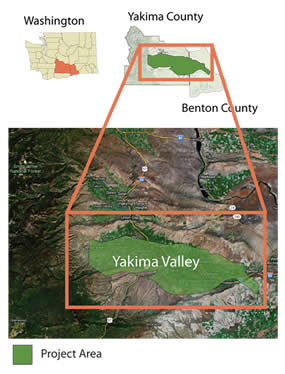Region 10 EJ Showcase Community: Yakima Valley, WA
Grants & Programs Topics
EJ Showcase Communities by Region
Overview
EPA Region 10 is addressing multiple environmental home health stressors in the Latino and tribal communities in the Yakima Valley. A coordinated effort between state, local, and non-profit partners is being used to address the range of exposures found in the community, with a primary focus on reducing exposure through contaminated private well drinking water. This is being accomplished by assessing homes with contaminated wells, providing ‘treatment at the tap’ mitigation, and reducing pollution sources through available regulatory tools and best management practices.
Successes
- Tested 600 private wells for nitrate contamination.
- Sampled crop fields, dairies, and sewage treatment units to link nitrate contamination to sources.
- Partnered with Yakima County through a $400,000 state grant to install well water filters in 166 homes.
- Added significant value to Region 10 and state assistance efforts.
- Supported an air quality issues meeting attended by over 100 stakeholders.
- Developed a comprehensive GIS tool of the Yakima Valley to guide the nitrate investigations; the tool is now being used to track other environmental health concerns in the community.
- Supported a situation assessment of over 23 groups and 65 stakeholders to identify areas of common ground on divisive issues pertaining to the cleanup of groundwater contamination.
History

Region 10 is working in the Yakima Valley of Washington state to address multiple environmental health stressors in drinking water and air in this intensely farmed rural area. Coordination within EPA programs and with tribal, state, and local governments, non-profits, university, and community partners is a key to reducing exposure of the rural poor residents to nitrate contaminated private well water. In the spring and summer of 2010, nearly 20% of the 500 homes assessed by EPA exceeded the federal standard nitrate standard of 10 parts per million (ppm). EPA sampling included research to link nitrate contaminated wells with the source, and the report is anticipated in the spring of 2011.
Yakima County recently received a $400,000 state grant to install point of use reverse osmosis systems on homes with elevated nitrate wells and at-risk family members, including infants, pregnant women, and immune compromised adults. Systems will be installed on up to 400 homes in 2011; however current estimates are that up to four times that many wells may be impacted by nitrate contamination.
Through 2011, EPA will provide families with certified drinking water analysis of their well water to raise awareness of their health risk and allow them to quality for the county-provided treatment systems. Efforts to reduce nitrate pollution may include enforcement actions under the Safe Drinking Water Act and increased use of best management practices from sources of nitrate including commercial fertilizer and animal waste. A situation assessment, conducted in the summer of 2010 by the Yakima-Kittitas Dispute Resolution Center, provided seven recommendations on how the various agencies and organizations can move forward on a common goal to reduce nitrate contamination.
The Yakama Reservation includes over 1 million acres of land within the Yakima Valley, and EPA Region 10 implements the Federal Air Rules for Reservations (FARR) to reduce air quality impacts to residents within the airshed. Community concerns on high asthma rates and other air quality impacts will be considered during a forum to be held on the Yakama Reservation in the spring of 2011. Results of the air quality forum may lead to revisions of the FARR regulations with the goal to improve air quality on the reservation.
For more information or to become involved, please contact: Sandy Halstead (halstead.sandra@epa.gov), 509-786-9225 or Wenona Wilson, 206-553-2148.
![[logo] US EPA](../gif/logo_epaseal.gif)